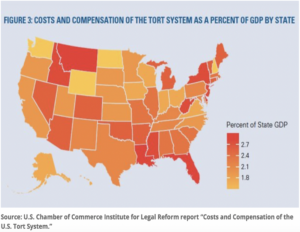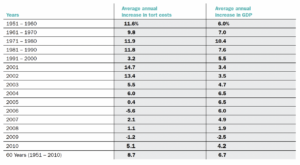- SB 591, as well as its predecessors in spirit, favors BIG business, not small. Small businesses, unless they are genuinely bad actors, have not and will not draw outsized litigation under the Missouri Merchandising Practices Act (“MMPA”).
- The MMPA is geared towards curbing common abuses—for example, unlawful lending, failure to disclose fees, and selling automobiles under fraudulent terms—that actually cause a deadweight loss to the economy. The offenders behind such practices would have you believe that, if they could simply absolve themselves of accountability for such, then they would create more jobs—there is NO evidence of this.
- SB 591 attempts to infuse the MMPA with constraining language that would both unduly hinder its efficacy and burden already disadvantaged groups (e.g., the elderly, the illiterate).
- The heyday of consumer-protection litigation, as well as tort litigation generally, actually occurred DECADES ago. The reports cited by those behind SB 591 willfully ignore this fact.
- Punitive damages in Missouri require a showing, backed by powerful evidence, that the underlying behavior was “outrageous” because of “evil motive or reckless indifference.” One does not simply show up before a jury and implore them to award punitive damages—a convincing demonstration must be made that the defendant was a bad actor.
- Ultimately, SB 591 is the brainchild of Washington lobbyists—not ordinary Missourians. As has been typical with these efforts, those behind it cite large numbers produced by completely unsubstantiated reports.
- At the root of SB 591 and similar bills are, in particular, the American Tort Reform Association (“ATRA”) and the U.S. Chamber Institute for Legal Reform (“ILR”). These are professional lobbying organizations working at the behest of large insurance and corporate defense firms.
- Generally, the studies and conclusions proffered by these “non-partisan” lobbyists suffer from an obvious logical flaw: they presume that upward variations in tort costs (which have actually slowed, even decreased, in aggregate over the decades as a percentage of GDP) are not a result of marginally increasing bad behavior by defendants but rather some flaw in the legal frameworks that have generally been in place for decades.
Even according to the ILR, a right-wing lobbying organization, Missouri’s tort costs are actually middle-of-the-road. The states with the highest tort costs as a percentage of GDP included Montana, Idaho, Louisiana, Mississippi, and West Virginia, none of which is known as a plaintiff-friendly venue. The lobbyists behind SB 591 have simply manufactured a sense of tort crisis in Missouri at the behest of large corporations:
WHY MISSOURI?

Here is a somewhat dated but useful overview graphic from a study, performed by ostensibly neutral consulting firm Towers Watson. According to the Towers Watson study, national tort costs, as a percentage of GDP, have been decreasing at the margin since 2002 and, more definitively, since the 1980s generally:
National Tort Costs Have Actually Been Declining
Relative to GDP Over Time!

For source information, click here: SB-591-One-Pager.docx

